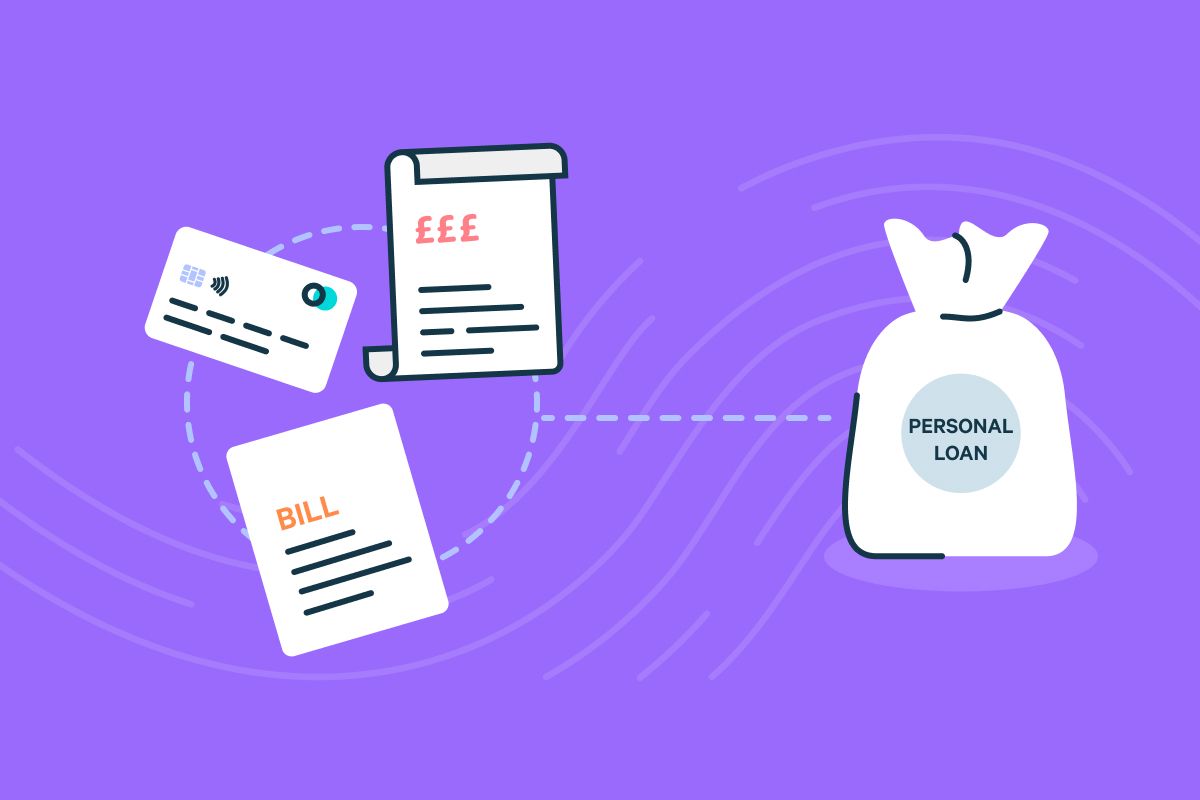It might seem easy-peasy to put outgoings on a credit card if money’s tight, or take out a payday loan a few days before our salary lands in our bank account. Sometimes just making it through the month is a win!
However, the problem with this approach is that if something unexpected then happens, it’s also very easy to miss a payment and fall into problem debt... which can quickly spiral out of control 🌪
Saving money into an emergency fund can help you withstand any short-term financial shocks, but if you find yourself in a situation where you're carrying multiple debts then it could be worth consolidating them into one.
What is debt consolidation?
Although it might sound complicated (and it should certainly be given careful thought), the concept of debt consolidation is really quite simple.
In essence, consolidating debt refers to the process of taking out one single new loan that can be used to pay off multiple current debts.
Credit cards, payday loans, and unarranged overdrafts all have notoriously high-interest rates, so by applying for more appropriate long-term finance you may be able to save money on your monthly payments, and also make your overall repayments easier to manage in the process.
There are two types of debt consolidation loans:.
A secured debt consolidation loan is a loan that is taken out against an asset, or ‘collateral’... in finance speak. That asset is usually a high-value item such as a car, or (if you’re a homeowner) your house 🏠
An unsecured debt consolidation loan is a personal loan that can be taken out without needing to be secured against collateral. The availability of these loans will be specific to you and dependent on your credit score.
Any debt that can be paid off early can be consolidated. This can include credit card debt, overdrafts, payday loans and outstanding utility bills.
How do debt consolidation loans work?
Before deciding to apply for a new debt consolidation loan, you need to do some calculations to make sure it’s right for you.
There are online loan calculators that you can use, and you may wish to seek professional advice to help you decide. Ultimately though, you’ll need to build a picture of the total amount of money that you need to consolidate from all of your current debts and work out the total repayment amount (this will be a product of the interest rate and expected time to repay) for each of them.
Whether you decide to apply for a secured or unsecured debt consolidation loan, pay close attention to finding one with a low-interest rate, and make sure your budget will definitely cover the monthly repayments.
If you’ve done your sums correctly then you should end up with just one manageable monthly payment to your new lender, and be able to gradually repay your debt over time 🙌
What are the benefits of debt consolidation?
For many borrowers, replacing multiple bills with a single monthly payment is a good enough reason to consider taking out a debt consolidation loan.
Having just one fixed repayment amount instead of fluctuating minimum payments e.g. credit cards can simplify budgeting and help you to plan.
However, one of the most significant benefits of consolidating debt is the amount of money that you can save on interest charges. Because debt consolidation loans tend to have lower interest rates and longer periods for repayment, your consolidated loan payments should be much lower. Win-win!
Taking out a debt consolidation loan might also help rebuild your credit score, because you’ll just need to make sure you can make the single monthly repayment on time and in full, instead of juggling credit card payments.
What are the risks of debt consolidation?
While interest rates might be lower on debt consolidation loans, you do need to carefully consider the total repayment amount over the course of the loan.
Debt consolidation loans are usually taken for longer-term, so it may mean that you will be in debt for a longer period of time, though sometimes this is a necessary evil if the payments are manageable and you’re sure that you can work your way to being debt free at the end of the loan term.
The most important thing is to be 100% sure that you can consistently afford to make monthly repayments.
If you don’t meet your responsibilities then your credit score might be damaged. Or, if you’ve taken out a secured loan and can’t keep up with the repayments, your collateral may even be repossessed.
Does a debt consolidation loan affect your credit score?
If you can stay on top of your payments, your credit rating will not be affected by taking out a debt consolidation loan. But as we’ve already mentioned, if you miss any payments, they will be recorded in your credit report.
Applying for a debt consolidation loan might also trigger a credit check known as a ‘hard inquiry'. It can cause a small temporary decrease in your credit score, but if you make your repayments on time the score quickly recovers.
If you have bad credit or poor credit history, you might not be able to take out a debt consolidation loan.
Is it a good idea to consolidate debt?
Unfortunately, there’s no simple answer here. Much like pineapple on pizza… debt consolidation isn’t right for everyone 🍍 As with many things in life (pizza toppings included) this will come down to personal choice.
A debt consolidation loan might not be suitable for someone who only has modest short-term debts. Conversely, if you’re feeling totally overwhelmed by debt, then a debt management plan or professional debt help advice might be more suitable.
In the UK, you can get impartial debt advice from The Money Advice Service.
Of course, the best solution for debt is to avoid it in the first place. If you’re looking for general advice on managing your personal finances then the Plum blog is a useful resource for information.
If you'd like to learn more about Plum then you can also check our website.
For all the latest Plum news and discussion, head to our Plummunity Forum, or follow us on Instagram and Twitter.

